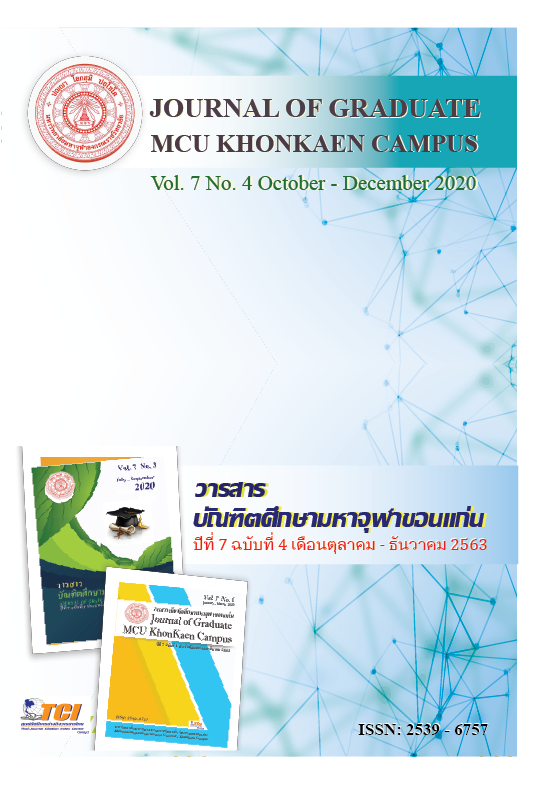THE DEVELOPMENT OF STUDENTS' HIGHER ORDER THINKING ABILITY IN THAI LANGUAGE CLASS BY USING LEARNING MANAGEMENT FOCUSING ON PROBLEMS SOLVING
Main Article Content
Abstract
This research is a qualitative research aimed at improving the higher thinking ability of students in Thai language classes. By using a learning management model that focuses on problem solving Target group is Grade 9 students from Ban Sa-at School Nong Na Kham District Khon Kaen Province Under the Office of Khon Kaen Primary Educational Service Area 5 in the second semester of the academic year 2019, consisting of 9 people. The research instruments were Video recording camera Observation form, interview form Voice recorder Field record form And still camera Data were collected by recording video of teacher learning management in developing advanced thinking ability of students in Thai language classes. By using a learning management model that focuses on problem solving in the classroom Interview student Analyze the qualitative data obtained from the protocol and data from interviews with key informants in the form of analytical lectures.
The result of the research shows that Advanced Thinking Ability of Students in Thai Language Classes Before Studying Still not able to use the thinking process to do advanced thinking tests The researcher therefore developed the advanced thinking ability of students in Thai language classes. With the management of open approach (Open Approach) and teaching methods (5E) found that the learning activities. Able to develop learners to have the ability to create knowledge by themselves Have analytical skills when facing problems Able to synthesize knowledge Have the skills to assess the value and give reasoning from what is read Have creative initiatives Can solve problems And have more discretion in learning The researcher assessed the advanced thinking ability of students in Thai language classes after studying. It is found that the learners have advanced thinking ability and can use the thinking process to do the advanced thinking test with the following results: 1) Developing high-level thinking ability of students in Thai language classes in Analytical thinking Found that learners exchanged knowledge together in the class To learn how to think, analyze, solve problems together. 2) Develop the advanced thinking ability of students in Thai language classes in synthetic thinking Found that learners exchanged knowledge together in the class To learn how to synthesize information Bring the knowledge together to solve problems. 3) Develop the advanced thinking ability of the students in the Thai language class in thinking of evaluating values. Found that the learners have linked knowledge Then can be evaluated in various situations, able to specify the reasoning for the assessment. 4) Develop the higher thinking ability of students in the Thai language class in creative thinking. Found that the learners have linked knowledge Then bring it to create new works and present correctly. 5) Develop the advanced thinking ability of students in Thai language classes in problem solving Found that students have identified problems And together to find the cause By joining the knowledge discussion group to use in solving problems from the teacher-created situation. 6) Developing the advanced thinking ability of students in the Thai language class in critical thinking. Have the ability to consider information before making a decision By searching for data, discussions, and concluding for decision-making And used to solve problems critically Test results after learning advanced thinking development It was found that the students passed the exam 100 percent, with an average score of 20.8 out of 30 full scores or 69.33 percent. This is caused by students being able to do exams after studying very well. Which can analyze the exam according to advanced thinking patterns Factors that result in the development of advanced thinking of students in Thai language classes. With the method of learning management by open approach (Open Approach) and teaching methods (5E) found that the learning activities. Able to develop learners to have the ability to create knowledge by themselves Have analytical skills Can synthesize knowledge Valuation Have creative initiatives Can solve problems And have more discretion in learning
Article Details
References
ชาตรี เกิดธรรม. (2545). เทคนิคการสอนที่เน้นผู้เรียนเป็นสาคัญ. (พิมพ์ครั้งที่ 1). กรุงเทพมหานคร : บริษัทโรงพิมพ์ไทยวัฒนาพานิช.
ตติมา ทิพย์จินดาชัยกุล. (2557). ผลการจัดกิจกรรมการเรียนรู้โดยใช้วิธีการแบบเปิด (Open Approach) ที่มีต่อความสามารถในการแก้ปัญหาและความสามารถในการให้เหตุผลทางคณิตศาสตร์ เรื่อง ทักษะกระบวนการทางคณิตศาสตร์ของนักเรียนชั้นมัธยมศึกษาปีที่ 3. วิทยานิพนธ์ศึกษาศาสตร์มหาบัณฑิต. บัณฑิตวิทยาลัย : มหาวิทยาลัยศรีนครินทรวิโรฒ.
ปกรณ์ ขันช้อน. (2547). การพัฒนาทักษะการคิด และผลสัมฤทธิ์ทางการเรียน กลุ่มสาระ การเรียนรู้วิทยาศาสตร์ของนักเรียนช่วงชั้นที่ 2 ชั้นประถมศึกษาปีที่ 5 โดยใช้รูปแบบ การสอนเพื่อพัฒนาทักษะการคิดด้วยกระบวนการวิทยาศาสตร์. บัณฑิตวิทยาลัย : มหาวิทยาลัยขอนแก่น.
ประเสริฐ ผลิตผลการพิมพ์. (2554). การ์ตูนติดเรต : ศตวรรษที่ 21. (พิมพ์ครั้งที่ 1). กรุงเทพมหานคร : มติชน.
สถาบันทดสอบทางการศึกษาแห่งชาติ (องค์การมหาชน). สรุปผลการทดสอบทางการศึกษาระดับชาติขั้นพื้นฐาน (O-NET) ชั้นมัธยมศึกษาปีที่ 3 ปีการศึกษา 2560. กรุงเทพมหานคร.
สำนักงานคณะกรรมการพัฒนาเศรษฐกิจและสังคมแห่งชาติ. (2555). แผนพัฒนาเศรษฐกิจและสังคมแห่งชาติ ฉบับที่ 11. กรุงเทพมหานคร : สำนักงานคณะกรรมการพัฒนาการเศรษฐกิจและสังคมแห่งชาติ.
สำนักงานคณะกรรมการพัฒนาเศรษฐกิจและสังคมแห่งชาติ. (2559). แผนพัฒนาเศรษฐกิจและสังคมแห่งชาติ ฉบับที่ 12. กรุงเทพมหานคร : สำนักงานคณะกรรมการพัฒนาการเศรษฐกิจและสังคมแห่งชาติ.
สุคนธ์ สินธพานนท์ และคณะ. (2545). การจัดกระบวนการเรียนรู้ : เน้นผู้เรียนเป็นสาคัญตามหลักสูตรการศึกษาขั้นพื้นฐาน. กรุงเทพมหานคร : อักษรเจริญทัศน์.
สุวิทย์ มูลคำ. (2549). การเขียนแผนการจัดการเรียนรู้ที่เน้นการคิด. กรุงเทพมหานคร : จุฬาลงกรณ์มหาวิทยาลัย.
อุบล กลิ่นหอม. (2550). การจัดการเรียนรู้โดยใช้วิธีสอนแบบสืบเสาะหาความรู้เป็นกลุ่มที่มีต่อผลสัมฤทธิ์ทางการเรียนภาษาไทย และความสามารถในการทำงานกลุ่มของ นักเรียนชั้นมัธยมศึกษาปีที่ 1. วิทยานิพนธ์ปริญญาการศึกษามหาบัณฑิต. บัณฑิตวิทยาลัย : มหาวิทยาลัยทักษิณ.

